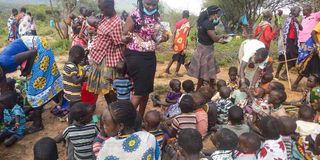West Pokot turns to mentorship in war on FGM, child marriage

Ms Teresa Cheptoo, World Vision project officer for the Girl Child Promotion Project, helps children in West Pokot. Woman Representative Rael Kasiwai and Governor Simon Kachapin’s wife, Scovia, have initiated a programme that mentors marginalised girls to embrace education and shun retrogressive practices such as FGM and early forced marriages.
What you need to know:
- The programme, spearheaded by Woman Representative Rael Kasiwai and Governor Simon Kachapin’s wife, Scovia, has helped girls acquire life skills to navigate transition to adolescence.
- The girls now overcome negative peer pressure, avoid risky sexual behaviour, drop negative attitudes towards education, and manage menstruation while in school.
Approaches to fighting harmful practices in pastoral areas of West Pokot County have been weak in the past years, making female genital mutilation (FGM) and early forced marriages rampant.
However, a new approach that involves mentorship is showing positive results, especially for girls in primary schools in marginalised, low-income areas. As a result, many girls who would be out of school have improved their academic performance, increased their attendance and stayed in school longer and delayed marriages, which previously involved those as young as 13-year-old.
The programme, spearheaded by Woman Representative Rael Kasiwai and Governor Simon Kachapin’s wife, Scovia, has helped girls acquire life skills to navigate the transition to adolescence, overcome negative peer pressure, avoid risky sexual behaviour, give birth to their first children at a later age, change negative attitudes towards education, deal more effectively with problems related to FGM and manage menstruation while in school. The drive has brought on board women leaders, professionals and role models.
The girls are sensitised to contentious matters that directly touch on their lives. Most of them now value education. Among the issues tackled are FGM, HIV/Aids, early forced marriage, child rights, responsibility, life skills for the girl-child, spiritual nourishment and health rights.
Speaking on Monday in Kapenguria, Ms Kasiwai said the initiative was bearing fruit, with many girls benefitting. “We are keen on ensuring girls access education. We thank the government for being committed to enforcing the anti-FGM law.”
Enhanced awareness
She said girls in all the 20 wards within the county have been sensitised to the dangers of FGM and early marriages. The lawmaker pointed out that the programme is changing the mindset of young girls and enabling them to focus on their dreams.
“Many drop out of school and are married off at an early age. Many have a hard life because of the vices. We want our children to embrace education. Every child has a right to a good life,” she said.
Mrs Kasiwai said retrogressive practices have had extreme effects on the girls and have to be fought at all costs. “We have empowered girls through teachings to escape the cycle of poverty and motivated them to give back to society. The opportunity will help prepare their future.”
She urged parents to focus on child protection, education, health and nutrition. “We want parents to support girls’ education, empower girls and shun outdated practices.”
She called on partners to strengthen the capacity of families and institutions to nurture and protect children from abuse of and all forms of violence and improve access to quality education.
Ms Kachapin said elected leaders, as key stakeholders, should fight retrogressive practices by passing bills to get funds for putting up rescue centres. “Talking will not be enough,” she said, urging residents to embrace the anti-FGM law passed in 2011. “We shall domesticate the law. There is a need to involve men to wipe out the rampant bad practices as they are the custodians of bad traditions.”





